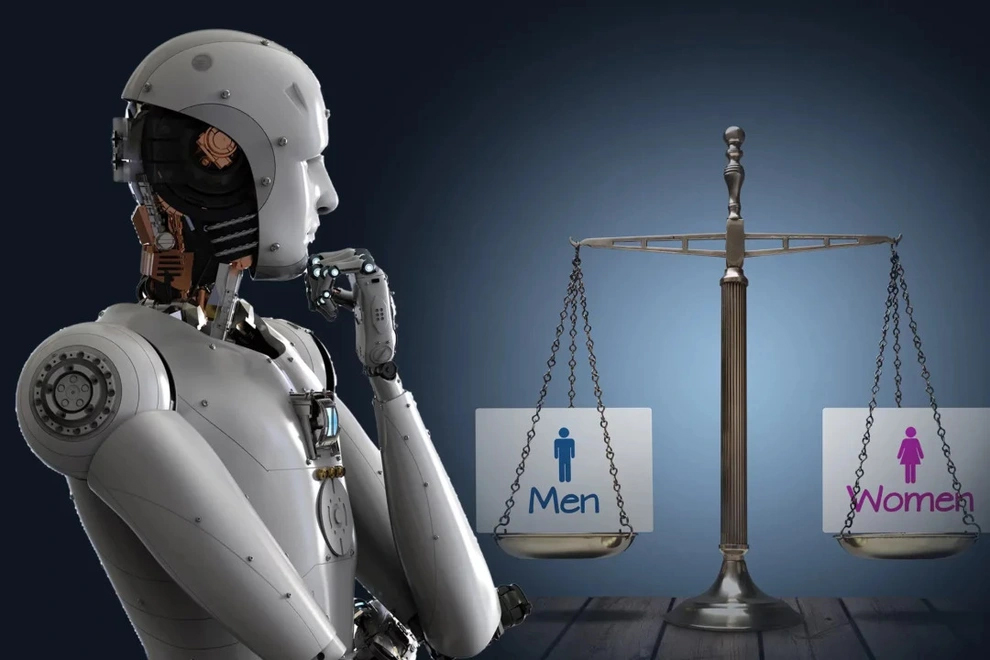What is Artificial Intelligence AI?
Artificial Intelligence (AI) is a field of technology that is capable of simulating human intelligence made through machines, especially computers, "learning" and "thinking" just like humans. AI can be applied in machine learning systems to simulate human intelligence, helping to perform tasks that previously only humans could do better than machines. At the same time, AI helps computers have the ability to reason to solve problems, understand and communicate through natural language, as well as learn and adapt themselves to new situations.

Artificial Intelligence (AI) is a field in computer science that has the ability to simulate human intelligence
Types of AI technology today
Artificial intelligence (AI) technology has developed strongly and is applied in a variety of fields, divided into many types, bringing special abilities and making great contributions to different areas of life. Here are 4 types of AI technology that stand out:
● Machine Learning
Machine learning is a method of data analysis that automates the construction of analytical models. Instead of specific programming, the system learns from the data, recognizes patterns, and makes decisions. Machine learning is applied in fields such as finance, healthcare, and suggestion systems on e-commerce platforms.

Machine learning is a method of analyzing data that automates when building analytical models
● Deep Learning
Deep learning is a branch of machine learning, this type of technology uses multi-layered artificial neural networks to simulate how the human brain works. This technology helps computers perform tasks such as image recognition, speech processing, and trend prediction. Typical applications include self-driving cars, chatbots, and medical analytics.

Deep Learning uses multi-layered artificial neural networks to simulate how the human brain works
● Natural Language Processing (NLP)
Natural Language Processing (NLP) is a field of artificial intelligence that enables computers to interact with human language. NLP can analyze emotions, translate automatically, work as a virtual assistant like Siri or Google Assistant, contributing to improving communication between humans and machines.

Natural language processing can analyze emotions, automatic translation helps improve communication
● Computer Vision
Computer vision helps machines "see" and understand the visual world through deep learning models. This technology is capable of facial recognition, reading license plates and even analyzing actions in videos. Common applications include security, medical, and manufacturing.

Computer vision helps machines understand the visual world through deep learning models
Benefits of Artificial Intelligence for Businesses
Thanks to the great development of artificial intelligence (AI), humans are greatly helped in all fields. Here are 4 outstanding benefits that AI brings:
● Intelligent automation
AI can automate simple processes, improving the efficiency of handling complex tasks. For example, AI-based invoice processing systems can automatically scan, sort, check for errors, and even process payments without much human intervention. As a result, AI automation saves time and minimizes errors in the operational process.
● Increased productivity
AI assists employees in accessing the necessary information quickly and accurately. Thanks to intelligent search engines, employees no longer have to spend time aggregating data from multiple sources. For example, Ryanair has applied AI to provide real-time information, improving productivity and employee satisfaction.
● Solve complex problems
AI is capable of analyzing large amounts of data and finding hidden patterns, helping to solve difficult problems such as fraud detection, equipment maintenance, and process optimization. Specifically, AI can recommend machine maintenance schedules based on temperature, speed, and usage history data, helping businesses save significant costs.
● Increase customer experience
Artificial intelligence helps businesses provide personalized service, from product recommendations to real-time customer support. AI systems such as chatbots or journey suggestions have helped customers have a smoother experience, while reducing the burden on the support desk. A good example is Lonely Planet, which applies AI to design personal travel itineraries, helping to cut content creation costs by 80%.
Advantages and disadvantages of artificial intelligence
Artificial Intelligence (AI) is opening up many breakthrough development opportunities for businesses and society, but at the same time, it also poses many challenges that need to be considered.
● Superior productivity: AI is capable of automating repetitive tasks, helping to free up human labor. It can process a huge amount of information and work at an outstanding speed, without being affected by fatigue or the need for rest, operating continuously 24/7.
● High accuracy: AI helps minimize human errors, thanks to its ability to analyze data and make decisions based on accurate algorithms. Therefore, AI helps to achieve more accurate results, especially in complex situations.
● Creativity: AI helps people in many creative fields such as art, music, and design, find breakthrough and new solutions to complex problems, and open up new directions in creativity.
● Experience personalization: Artificial intelligence can be based on consumer behavior and thereby provide relevant services and products to customers, contributing to improving customer experience in various fields such as shopping, entertainment, etc education.
● Solving global problems: AI can be applied in critical fields such as health, environment, and energy, helping to solve global challenges such as risk prediction and disaster prevention, and big data analysis to come up with innovative solutions.
Besides the above advantages, AI also has disadvantages that humans need to understand and consider:
● Discrimination: AI can be skewed if the input is not objective enough or biased, leading to unfair decisions. Therefore, AI can affect disadvantaged groups in society, creating unwanted discrimination.
● Ethical issues: One of the biggest concerns is that AI could spiral out of human control, especially when the technology is used for nefarious purposes such as developing automated weapons or manipulating information. Therefore, AI requires strict regulations to control their development and application.

AI can be applied in fields such as health, the environment, and energy, helping to solve global challenges
Application of artificial intelligence in life
Artificial intelligence AI is commonly applied in many fields such as:
In the transportation industry
AI has been strongly applied in self-driving vehicles, especially cars. This technology helps optimize operating costs and minimize traffic accidents. A good example is that in 2016, Otto (a subsidiary of Uber) successfully transported 50,000 cans of beer by self-driving cars, saving costs and transportation time. Self-driving car systems connect to each other via Wifi to provide optimal routes, predicting the future of the transportation industry. At the same time, the intelligent traffic system (ITS), which uses vehicle identification and monitoring traffic violations, improves the quality of life of residents.

AI has been strongly applied in self-driving vehicles such as cars
In production
AI brings significant benefits in the manufacturing sector, they help optimize the production process and support intelligent decision-making in the selection of production methods and materials. AI systems are capable of analyzing and processing big data, helping businesses improve productivity and minimize errors in production.

AI helps optimize production processes and supports intelligent decision-making
In medicine
AI has made important contributions to improving the quality of healthcare. Machine models are used to analyze medical data and assist doctors in making more accurate diagnoses. A typical application is the use of AI in drug development and medical research, helping to minimize research costs and time. In addition, AI is also being applied in the management of medical records and the provision of telehealth services.

Artificial intelligence has made a huge contribution to improving the quality of human health care
In education
AI has created major changes in education through the automation of processes such as grading and tutoring. AI tools help track students' learning progress, tailor learning methods to their individual needs, and support students to learn anytime, anywhere. At the same time, the introduction of AI tutors also opens up opportunities for students to learn at their own pace and program.

AI helps humans by automating processes such as grading and tutoring
In Communication and Business
Artificial intelligence helps companies optimize ads and reach target customers more accurately. AI analyzes data on user behavior to come up with relevant ads, thereby improving the effectiveness of marketing strategies for businesses. In addition, AI also helps businesses automate tasks such as document drafting, content design, and customer service management 24/7 via chatbots.

Artificial intelligence helps businesses optimize ads and reach target customers more accurately
In the service industry
AI in the service industry helps analyze customer usage behavior, thereby providing personalized solutions such as product suggestions, service process adjustments, and user experience. Functions such as smart chatbots and AI-integrated virtual assistants help businesses take care of customers 24/7, reduce waiting times, and optimize operating costs.

In the service industry, AI helps analyze customer usage behavior
In Information Technology and Software Development
AI brings many outstanding improvements in the IT industry, specifically AIOps (Artificial Intelligence for IT Operations) technology that helps predict and prevent system failures, ensuring stability and security for digital platforms. In addition, AI also has programming support tools such as GitHub Copilot and Tabnine to help programmers write code faster, suggesting code snippets that are suitable for the context, thereby improving work efficiency.

Artificial Intelligence brings many great improvements in the Information Technology industry
Application of AI in the marketing industry - digital content creation
Content production automation
Today, businesses can leverage AI in various fields such as SEO optimization, social media management, email marketing drafting,... For marketers, AI has become an effective assistant. Under pressure to constantly innovate content to keep up with trends, AI helps them quickly adjust their marketing content to suit each specific strategy.

AI helps businesses create content quickly
While AI has not completely replaced human creativity and thinking, it has significantly assisted in shortening work time and improving productivity. In particular, this is the optimal solution for small businesses, helping them save costs while still having quality content.
Some AI tools that are useful in content creation include ChatGPT, Google Bard AI, Copy AI, Smartwriter, Compose AI,...
Image Creation
Artificial intelligence (AI) not only supports the creation of text content but can also analyze and design images, opening up countless breakthrough opportunities in the field of marketing and e-commerce.
One of the most impressive applications of AI is its ability to recognize images
Now, users only need to upload a product photo, and the system will instantly scan and search for similar items on the website, helping them access the exact product they want quickly and conveniently than ever before.
Some AI tools can assist in the search and design of outstanding images such as Google Lens, Midjourney, StockAI,...
Supports text and speech recognition
Voice search is becoming an increasingly popular trend and is forecast to grow stronger in the near future. Currently, many AI tools support speech-to-text with impressive accuracy, facilitating businesses to apply Voice SEO effectively. Some prominent tools include Google Gboard, Google Docs, Voice Text, Laban Key, and especially the Speech to Text tool developed by Viettel AI, which stands out for its high accuracy and optimal Vietnamese language processing capabilities.

Viettel AI - Speech-to-text service
Taking advantage of voice recognition AI not only helps businesses optimize marketing content, but also creates modern methods of approaching customers, improving marketing performance in the digital era.
Chatbots and virtual assistants in marketing
Chatbots have become one of the important AI applications in marketing, helping businesses improve customer experience automatically and effectively. Developed based on natural language processing (NLP) technology, chatbots are capable of assisting in answering questions, taking care of customers quickly, and building relationships with potential customers. In addition, this tool helps to automatically respond to frequently asked questions, reduce the pressure on the customer care team, and optimize the interaction process.
Chatbots are one of the important AI applications in marketing
Conclusion: After learning through the article, it can be seen that artificial intelligence (AI) is a technology that has been applied in a variety of fields of life as well as in the application of AI in marketing, accompanied by challenges that need to be overcome. Viettel AI hopes that the above article helps you understand AI and apply it effectively.
Other news















